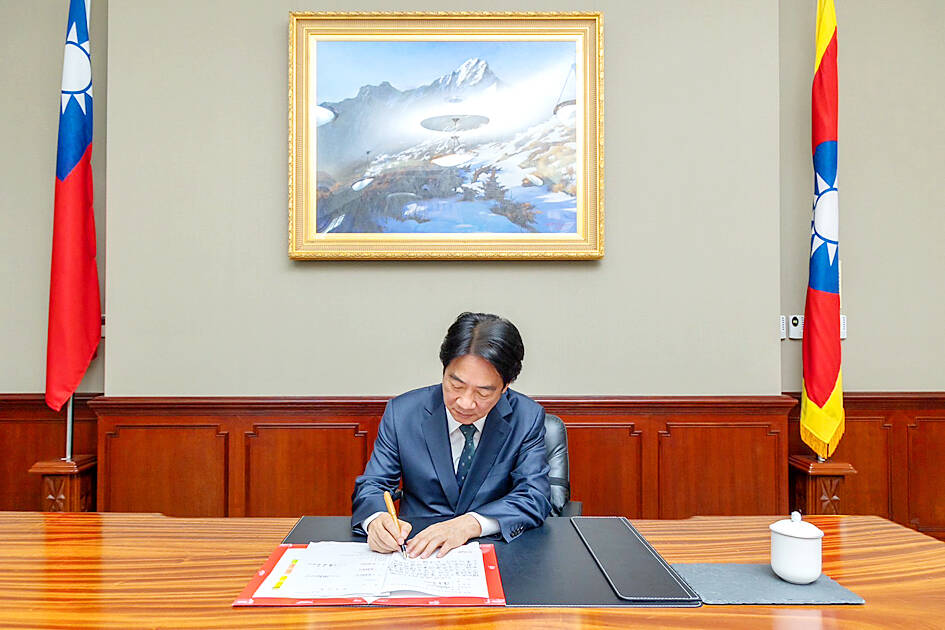President William Lai (賴清德) yesterday said he had signed into law controversial amendments that would expand the legislature’s power, but that he would soon seek a ruling on their constitutionality.
Lai said he supports legislative reform, but not the unconstitutional expansion of legislative power.
“Legislative reform must comply with the law and the Constitution,” he said.

Photo courtesy of the Presidential Office
The Legislative Yuan’s investigative powers must not infringe upon judicial power and the power of the Control Yuan, “let alone infringe upon people’s basic rights such as privacy, business secrets and freedom from compelled speech,” he said.
Lai said he would therefore seek a ruling from the Constitutional Court to safeguard constitutional order and uphold people’s basic rights.
He added that he would also apply for “a preliminary injunction” by the court to stop the amended laws from being implemented before it issues a ruling on their constitutionality.
Regarding the amendments “obligating” the president to deliver an annual state of the nation address to the legislature and engage in an impromptu question-and-answer session, Lai said it was an “attempt to change the constitutional design of responsible government.”
The constitutional order deems that the president is not accountable to the Legislative Yuan and is therefore not required to deliver an address to the legislature. However, the president can choose to do so voluntarily.
The amendments also conflate the Executive Yuan — which is accountable to the Legislative Yuan — delivering policy reports with the president’s address to the legislature, he said.
The Constitution and the law governing legislative power already have a mechanism for the Legislative Yuan to “listen to” the president’s state address.
“I have said before I am willing to deliver it in the legislature under an arrangement in compliance with the Constitution,” Lai said.
He added that he would deliver the address to the legislature only after a Constitutional Court ruling on the issue.
Lai called on the opposition parties not to make “rash decisions” before the ruling.
In response to the opposition’s claims that Constitutional Court judges were appointed by the ruling Democratic Progressive Party’s administration and so are likely to rule in favor of the government, Lai said they were appointed by different administrations and have made a range of rulings.
“They have made the rulings to safeguard Taiwan’s democratic constitutional order and to move the country forward. I believe they will do so this time as well,” he said.
The Legislative Yuan on Friday voted down the Cabinet’s request for it to reconsider the amendments to the Act Governing the Legislative Yuan’s Power (立法院職權行使法) and the Criminal Code.
The Cabinet and the DPP have said they would separately seek rulings from the Constitutional Court.
The Control Yuan yesterday said it would also hold a press conference today to state its decision to seek a ruling from the Constitutional Court as well as file a “preliminary injunction” to safeguard its rights.
Additional reporting by Lin Tse-yuan

AIR SUPPORT: The Ministry of National Defense thanked the US for the delivery, adding that it was an indicator of the White House’s commitment to the Taiwan Relations Act Deputy Minister of National Defense Po Horng-huei (柏鴻輝) and Representative to the US Alexander Yui on Friday attended a delivery ceremony for the first of Taiwan’s long-awaited 66 F-16C/D Block 70 jets at a Lockheed Martin Corp factory in Greenville, South Carolina. “We are so proud to be the global home of the F-16 and to support Taiwan’s air defense capabilities,” US Representative William Timmons wrote on X, alongside a photograph of Taiwanese and US officials at the event. The F-16C/D Block 70 jets Taiwan ordered have the same capabilities as aircraft that had been upgraded to F-16Vs. The batch of Lockheed Martin

US President Donald Trump yesterday announced sweeping "reciprocal tariffs" on US trading partners, including a 32 percent tax on goods from Taiwan that is set to take effect on Wednesday. At a Rose Garden event, Trump declared a 10 percent baseline tax on imports from all countries, with the White House saying it would take effect on Saturday. Countries with larger trade surpluses with the US would face higher duties beginning on Wednesday, including Taiwan (32 percent), China (34 percent), Japan (24 percent), South Korea (25 percent), Vietnam (46 percent) and Thailand (36 percent). Canada and Mexico, the two largest US trading

GRIDLOCK: The National Fire Agency’s Special Search and Rescue team is on standby to travel to the countries to help out with the rescue effort A powerful earthquake rocked Myanmar and neighboring Thailand yesterday, killing at least three people in Bangkok and burying dozens when a high-rise building under construction collapsed. Footage shared on social media from Myanmar’s second-largest city showed widespread destruction, raising fears that many were trapped under the rubble or killed. The magnitude 7.7 earthquake, with an epicenter near Mandalay in Myanmar, struck at midday and was followed by a strong magnitude 6.4 aftershock. The extent of death, injury and destruction — especially in Myanmar, which is embroiled in a civil war and where information is tightly controlled at the best of times —

China's military today said it began joint army, navy and rocket force exercises around Taiwan to "serve as a stern warning and powerful deterrent against Taiwanese independence," calling President William Lai (賴清德) a "parasite." The exercises come after Lai called Beijing a "foreign hostile force" last month. More than 10 Chinese military ships approached close to Taiwan's 24 nautical mile (44.4km) contiguous zone this morning and Taiwan sent its own warships to respond, two senior Taiwanese officials said. Taiwan has not yet detected any live fire by the Chinese military so far, one of the officials said. The drills took place after US Secretary